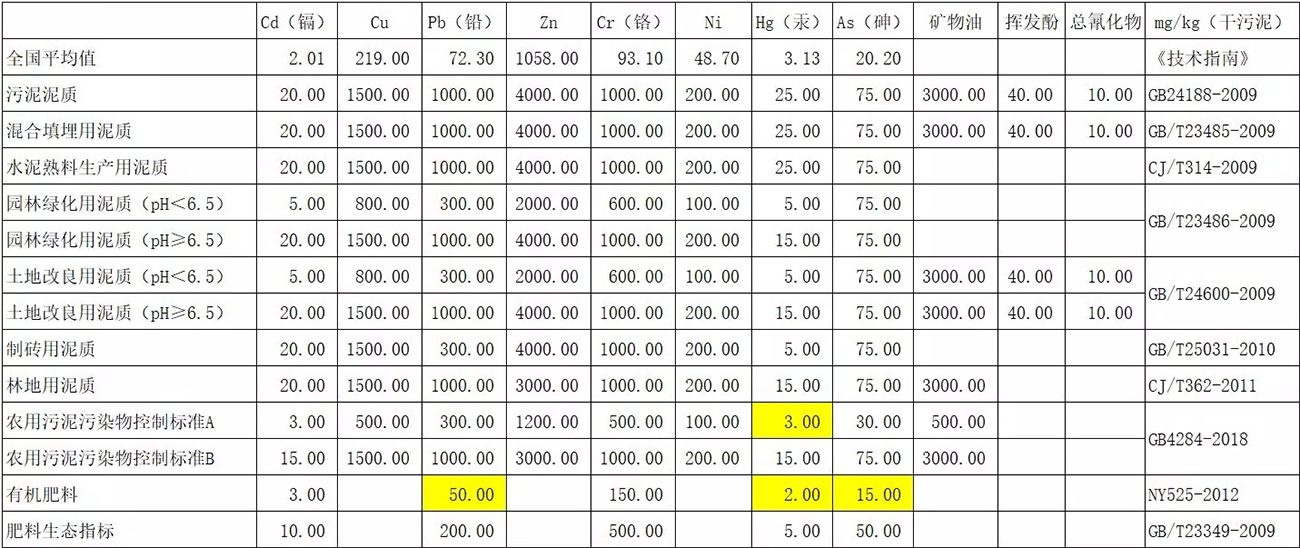

Date:2020-03-06 Views:3641
Sludge standard
Classification of Sludge Disposal in Urban Sewage Treatment Plants (GB / T 23484-2009)
"Muddy for mixed landfill of sludge disposal in urban sewage treatment plants" (GB / T 23485-2009)
"Urban sludge for sludge disposal in urban sewage treatment plants" (GB / T 23486-2009)
"Urban Quality for Land Improvement for Sludge Disposal in Urban Sewage Treatment Plants" (GB / T 24600-2009)
"Sludge for Separate Incineration of Sludge Disposal in Urban Sewage Treatment Plants" (GB / T 24602-2009) "Sludge for Sludge Disposal of Bricks in Urban Sewage Treatment Plants" (GB / T 25032-2010)
"Urban Sludge Disposal for Cement Clinker Production" (CJ / T 314-2009) "Urban Sewage Disposal Sludge Disposal for Forest Land" (CJ / T 362-2011) "Urban Sewage Treatment Plant Standard for Sludge Treatment Stability "(CJ / T 510-2017)
among them:
The first three are national mandatory standards, beginning with "GB";
The middle six are national recommended standards, beginning with "GB / T";
The last three are recommendations for housing construction, beginning with "CJ / T";
Leaving aside the mandatory standards of the first three countries, almost all "GB / T" are upgraded from "CJ / T".
For example, "Urban Sludge Disposal Land Improvement Sludge Disposal" (GB / T 24600-2009) was upgraded from "Urban Sewage Treatment Sludge Disposal Land Improvement Slime" (CJ / T 291-2008). .
Moreover, the source of such standards is almost all from the Urban Construction Department of the Ministry of Housing and Urban-Rural Development (the famous predecessors Zhang Yue and Cao Yanjin are from this department). Gao, but the "inspection" style that has prevailed in the past two years is another topic.
Sludge policy
"Sewage Sludge Treatment and Treatment and Pollution Prevention Technology Policy for Urban Sewage Treatment Plants (Trial)" Ministry of Housing and Construction 20090218 "Guide to Best Available Techniques for Sludge Treatment and Treatment of Pollution Prevention and Treatment in Urban Sewage Treatment Plants (Trial)" Ministry of Environmental Protection 201002 Technical Guide for Sludge Treatment and Disposal (Trial)》 201103
On February 18, 2009, the Ministry of Housing and Urban-Rural Development, the leading management department of the sludge industry, issued a program document for the sludge industry, "Technical Policies for Sludge Treatment and Pollution Treatment in Urban Sewage Treatment Plants (Trial)." The Ministry of Ecology and Environment respectively issued relevant "Technical Guides" accordingly.
For the time being, not to mention the two scaffolds on sludge business, these two "Technical Guides" are indeed full of dry goods, and provide the most perfect textbook for newcomers to understand the overall industry situation.
Sludge heavy metal
One of the most interesting things in sludge is heavy metals.
Excessive heavy metal content (especially free form) means that the sludge is no longer a general solid waste, but is transformed into hazardous waste. The treatment method and price are no longer a level.
So how are heavy metals defined in the sludge standard?

The object we discuss in the table is the sludge produced by a sewage treatment plant that meets the "sludge sludge quality" standard, and the following rules can be found:
All sludges fully meet mixed landfill and cement clinker standards;
Domestic sludge generally meets standards for landscaping, land improvement, brick making, and woodland;
Domestic sludge is difficult to meet agricultural sludge A and organic fertilizer standards;
From this we can basically set the standard municipal sludge products: everything can be used except for eating.
Agricultural sludge
Earlier, we adjusted the conventional municipal sludge, which basically cannot be used for agriculture and cannot enter the food chain, but it can be used as nutrient soil, green soil, matrix soil, backfill soil, and bio-carbon soil.
(Seeing so many new names for "soil" is really embarrassing for those of us who are environmentally friendly. In such an unprofessional situation, there are so many colorful names)
But there are two issues involved:
Fertilizer registration certificates are required in the agricultural field to purchase and sell agricultural fertilizers;
The demand for "nutritive soil" in the non-agricultural field is more government procurement, and the sludge products do not have identification certificates similar to "fertilizer certificates";
It can be seen that the key to sludge products lies in "fertilization".
So, can the sludge products obtain a fertilizer certificate?
I have no evidence to prove it, but I have no evidence to prove it, such as the following regional policies:
"Guangdong Province's Opinions on Further Strengthening the Management of Agricultural Resources" (Yuefuhan [2015] No. 327) "Gansu Province Fertilizer Management Measures" (Gansu Provincial People's Government Order No. 122) Guiding Opinions "(Su Genghuan [2019] No. 19)
Opinions of Zhejiang Province on Further Strengthening and Standardizing the Management of Organic Fertilizer Registration (Zhe Nong Zhuan Fa [2018] No. 117)
It can be seen that the "setting" of the sludge product that we have previously basically "runs".
tail
Perhaps we treat the sludge problem too harshly;
Perhaps we have too high expectations for sludge projects;
I once shared Xu Haiyun's views on domestic waste:
Trash is actually a waste and useless thing. After all the items have completed their useful life, the final destination is to become trash. Therefore, the conditions when the trash was born were useless or low value.
Reading today, I still remember.
It is worth emphasizing that we are not treating sludge for a certain technical route, but just looking for a suitable technical route for sludge disposal. That's it.